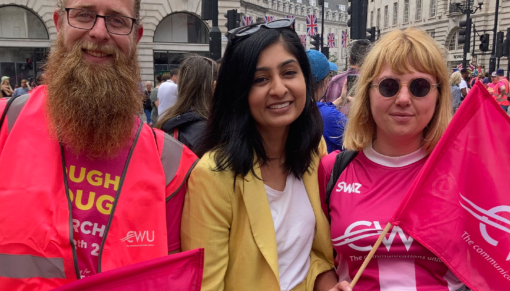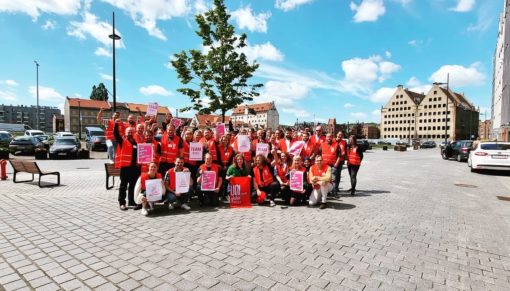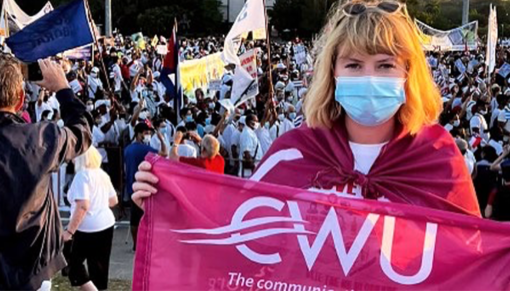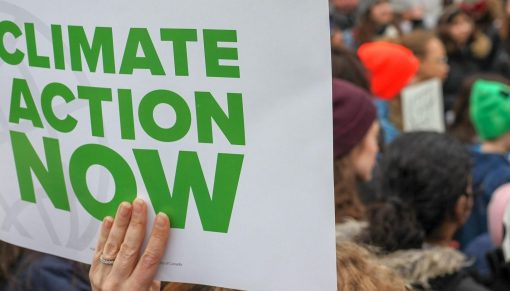Young Trade Unionists’ May Day Brigade 2022
July 1 2022This Spring, I was fortunate enough to be elected to represent the CWU National Young Worker Committee at the May Day Parade in Cuba. 33 young trade unionists, from 7 different British and Irish trade unions, travelled to Havana with the Cuba Solidarity Campaign (CSC) to participate in the workers parade on May 1st. The delegation attended various political engagements over two weeks, including a conference with President Miguel Diaz-Canel, meetings with trade union leaders and visits to local community organisations, known as Committee’s for the Defence of the Revolution (CDR’s).
We also visited iconic locations of the revolution including Santa Clara, the Cuban city the guerrilla army captured in 1958 and the resting place of Che Guevara. As well as, Santiago, home of the Moncado Barracks and Siboney Farm. Here Fidel Castro and Che mobilised the revolutionaries who fought for the liberation of the Cuban people. Santiago is also the final resting place of Jose Marti and Fidel Castro.
The trip was an inspiring insight into a sustainable, socialist society in a neoliberal world, post- ‘the end of history’. The United Kingdom and the trade union movement have a lot to learn from Cuban principles, practices and their way of life. In this report I will share the socialist ideals the Cuban people were generous enough to share with us, despite the constraints of the US blockade. As the saying goes in Cuba, ‘solidarity is about sharing what you have, not what you have left’.
The Cuban Revolution and the US Blockade
Fidel Castro and Che Guevara mobilised a socialist rebellion that ousted the Batista dictatorship in 1959. In 1976 Castro’s revolutionary constitution set out a strategy to improve the social conditions in Cuba, based on principles of equality, cooperation and social justice. The constitution includes progressive policy on the economy, education, rights, citizenship, the structure of the state and local people’s power. Castro was guided by anti-imperialism, Marxism and a commitment to never returning to a capitalist regime, contending “capitalism has neither the capacity, nor the morality, nor the ethics to solve the problems of poverty.” However, in 1960 the US imposed an economic blockade on Cuba in response to the revolution, which means the island cannot trade with America and other countries. As a result, the material conditions in Cuba are poor and accessing basic provisions is made difficult for the people. The country is forced to import provisions, such as food, from alternative markets which is costly. Consequently, the cost of the blockade since its introduction is estimated to be around 753 billion dollars.
The Cuban First Secretary, Miguel Fraga, spoke to the delegation about how the economic war on Cuba has been exacerbated by Trump’s populist administration and further intensified during Covid-19. Trump imposed travel restrictions that banned cruises, as well as educational trips from the states, in an ideological attempt to damage Cuba’s tourism industry and suppress international socialism. In addition, throughout the pandemic, the US obstructed the procurement of life saving equipment such as, ventilators, syringes and PPE. Furthermore, to promote the hegemony of neoliberalism, the right-wing media continues to spread propaganda about the apparent threat Cuba poses to its people and the western world. Sadly, the ‘fake news’ not only manufactures consent among the right, it also paradoxically manipulates young Cubans into dissenting to America, despite their discontent arising from the poor material conditions caused by the US Blockade.
Trade Unions and the Family Code
Cuba is governed by a socialist economic system based on the shared ownership of production and property. The constitution states that workers can participate in the economic planning, regulation, monitoring and management of labour. Therefore, worker collectives are actively included in the administration and management of state governed business. All Cubans are entitled to the opportunity of dignified work, regardless of their sex, gender, age, disability, ethnicity or religion. Paid labour is the main source of income and is considered to be a right, a social duty and a source of honour for all those able to work. Nevertheless, payment is supplemented by the ‘just and free’ access to universal social services and provisions.
The Trade Union Confederation in Cuba spoke to the UK delegation about the structure of trade unions, the role of trade union representatives and the participation of workers. We learned that there are 19 different trade unions in Cuba, categorised by specific sectors and industries. In each workplace there is a trade union representative, a communist representative and a young communist representative. The representatives meet with worker assemblies once a month to discuss any concerns or grievances they may have in the workplace. The workers elect the representatives and can replace them at any time if they feel they are not being properly represented. Young workers are especially encouraged into positions as they are thought to have more of a vision of the future and an appetite for the continued revolution. Afterall, Fidel Castro said, “in the face of any object difficulty, men must grow… what should never be accepted is any excuse to stop fulfilling a task, nor allow difficulties to become justified”.
The state recognises young people as active participants in society and promotes their holistic development through the Family Code. The constitution states that parents must educate their children with moral, ethical and civic values that correspond with the socialist society. Therefore, Cubans are taught from a young age about their social responsibilities and the importance of their participation in the collective economy. Fidel said the people must know their duty in the defence of the revolution and outlined their duties in the constitution in 1975. However, the Family Code is currently being reviewed and discussed by the Cuban people in mass municipal assemblies. The proposed amendments to the constitution include same-sex marriage and adoption, as well as new rights for vulnerable adults and children.
Education and Health Care
Fidel Castro believed a revolutionary government should undertake the reform of education and that an educated country will always be strong and free. Similarly, Che Guevara contended that society must become a ‘gigantic school’, in order to combat individualism, mobilize the masses and build collective consciousness. Therefore, the education of Cubans is prioritised to promote ‘praxis’, the process in which the people learn the theory necessary to actively practice the revolution and to develop the country. Article 32 of the constitution, ‘Principals of Educational, Scientific and Cultural Policy’, outlines the progressive Cuban and universal pedagogical traditions, with a view to advance science, creation, technology, innovation and thought. Scientific research and employment in health care is especially encouraged in Cuba, to solve problems of social concern, with the highest ratio of doctors to population in the world.
During our trip, we visited the Instituto De Medicina Tropical, Pedro Kouri (IPK), the facility that has produced Cuba’s own Covid-19 vaccine. The scientists there told us, as of January 2022, Cuba had fully vaccinated 88 per cent of their population, of all ages and have successfully managed to control the Omicron variant. A delegate asked the scientists if the state has experienced any resistance from the people about having the vaccine. The answer was simply that Cubans trust in the vaccine because there are no vested interests in its production and that they know it is their social responsibility to be vaccinated, in order to protect Cuba and the rest of the world. Next, Cuba plans to export the vaccine to other countries in the global south who have suffered the most during the pandemic due to the western world colonising the vaccine. The World Health Organisation (WHO) are currently assessing the vaccines efficiency and the production facilities in Cuba to be able to produce them internationally.
Agriculture and Environmentalism
The Cuban constitution states that the land is the socialist property of the people. Thus, agricultural cooperatives are sustained by the collective labour of the masses and through principles of mutual aid. While we were in Cuba, the young worker delegation visited and worked on a cooperative, where crops are grown, harvested and shared communally. It was exciting to see first-hand, an example of a circular economy, in which the resources are produced locally on a needs basis and the agricultural labour is maintained for the workers in the community. The delegation also visited an agricultural factory called ‘Labiofam’, where natural resources are used to produce pharmaceuticals for humans and animals, ranging from cancer treatments to cosmetics. We were told the Soviet Union helped the Cubans to establish the biotech facility by sharing their knowledge and machinery. Nonetheless, after the fall of the wall, Cuba was able to continue to successfully develop technology and science for itself. In more recent times, Labiofam has exported pharmaceuticals to countries such as Africa, to help treat viruses like Ebola. However, this has been made difficult by the blockade, which blocks finances and resources due to the organisation being considered revolutionary. Nevertheless, Cuba continues to progress by producing their own resources they need that they cannot import as a result of the blockade and sharing medicine with third-world countries.
Unsurprisingly, given Cuba’s strong agricultural industry and reliance on insourcing, the state promotes the protection of the environment and resources, calling for the ‘eradication of irrational patterns of production and consumption’. Fidel Castro himself said “humankind is at the risk of disappearing due to the rapid and progressive elimination of it natural habitat”. Nonetheless, Cuba has been ranked the most sustainable country in the world in the Sustainable Development Index, in which C02 emissions are measured against human development levels in education and life expectancy.
Reflecting on Cuba
Throughout all our activities in Cuba there was a strong sense of patriotism among the people and a devotion to the revolution. This could be felt among the workers on the camp where we stayed, in the local communities and workplaces we visited; and at the conference we attended with the head of state. At the May Day Parade the respect and appreciation of the working class was especially notable by the inclusion of all the workers in the celebrations and the vast size of the delegations from each industry. It was a surreal experience, watching workers being celebrated and honoured in the way they are in Cuba, in comparison to the attitudes toward the working class and trade unions in the United Kingdom. Cuba may struggle materially due to the blockade; however, the people are provided with universal services which mean they are not alienated from themselves and have an abundance of freedom of expression. The Cuban people are educated about the revolution from a young age and understand how politics underpin their industrial duty at work and within the trade union movement. The UK trade union movement must get better at educating young workers about the history of the working class and the wider politics that inform their industrial experience. Empowering workers is a difficult task in our own country given the normalisation of inequality and the class-based education system, however, as Castro said, “revolution is not a bed of roses”. Cuba’s commitment to raising political consciousness through the education of the working class proves knowledge really is power. Furthermore, Cuba’s support to other third world countries and dedication to protecting the socialist ideology from anti-imperialism, is something we can all learn from on the left in terms of international socialism and its promotion. Moving forward I will encourage branches within my own union to affiliate with the Cuba Solidarity Campaign (CSC) to support the continuation of the good work the organisation does to help Cuba and to defend socialism. I have also put CSC in contact with the trustees of CWUHA, so that the two organisations can collaborate in providing aid for Cuba. I would like to thank the CWU National Young Workers Committee for electing me to represent our union in the brigade. In future I would recommend that we elect at least two delegates, so together they can also learn Cuban socialist principles and revolutionary practices, to invigorate our movement in the United Kingdom on their return and share the remarkable truth about Cuba.
VIVA LA CUBA, VIVA LA REVOLUCION!








